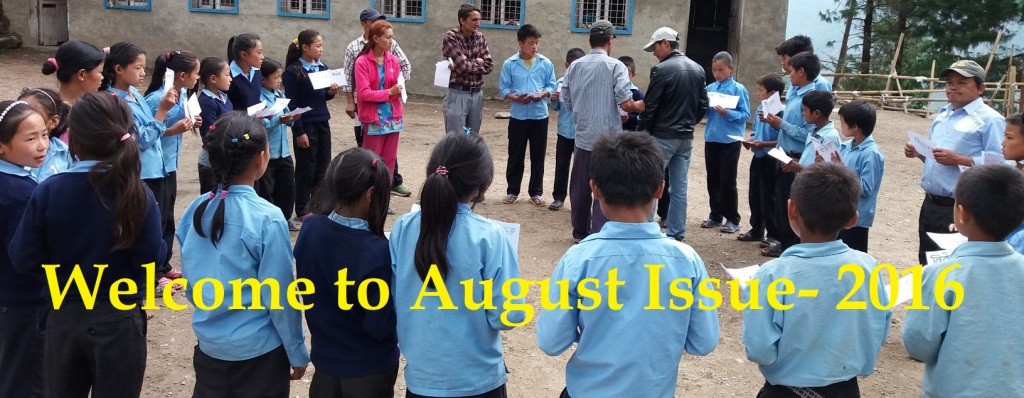
Dear Choutari readers,
In the midst of long silence because of technical and other issues, we are back with the special issue of ELT Choutari. This is the second issue of this year which focuses on several aspects of ELT. Before listing out the blog entries of this issue, let me reflect on my experience and observation on some aspects of ELT.
I am fortunate to observe hundreds of English lessons in the past two years in rural parts of Nepal. My experience of working with teachers in schools and training venues in diverse topography and culture in Nepal has shown that many teachers are still facing challenges in lesson delivery process. ‘Fresh’ university graduates who have ‘successfully’ completed pre-service teacher education program have been unable to deliver English lesson really effectively though having authorized license to teach.
Then where is the problem? In my opinion, the problem lies in the way we perceive a language, our profession (ELT) and the meaning of language teaching. The problem lies on how we make sense of a language to be taught as a course, the language to be used as a medium of instruction and the content to be taught (if it should be).
Every human being makes sense of the world differently. They obviously have their own ideas, concepts and perceptions towards overall meaning of language teaching. In this light, I have similar observations as Rebecca Reymann, a contributor of this issue has, in many parts of the country. We as teachers are investing our effort in memorization. I agree with her in a way ‘language is a beautiful tool for expression’. It has to be taught in a context differently in different grades but not through memorization. Every child is unique and he/she does not get success in language learning through the same route. The children have their own perspectives toward the language, language learning process and the world. In the same way, they have their own ability to grasp language.
So far we talk about ELT as a teaching profession, many of us might have different explanations for this choice. Samita Magar, another contributor, decided to pick ELT simply because she is influenced by her teacher when she was in school. She finds this profession more creative and respectable than others. It shows that the identity of English teacher is perceived differently by different people. In the past, to some extent teachers had an uniform identity. They were considered priests, the messenger of Gods and the personalities with high morale. In the east, this sort of identity is still in existence to some extent. However, the overall observation of English teachers’ identity has been changing with time. It is witnessed at present that there is no uniform opinions and beliefs why a person chooses ELT as a profession.
Likewise, as the time has changed in the way we teach children, the way teacher educators and trainers facilitate training sessions has been changing. The focus has been shifted to the achievements of the students along with the teacher learning. Ekraj Koirala, a teacher trainer, recently experienced a better way through school based teacher training modality in Nepal. Teachers have different expectations and challenges in their own contexts. In this regard, the same cascade model may not be appropriate in all cases.
At the same time, the approaches of teacher education in universities and academic institutions have been changed. Distance and open learning system have been introduced by several universities to prepare teachers. Similarly, private schools have different requirements for recruiting teachers and government has its own. Kiran Thapa, a scholar from Kathmandu University, discusses issue of certification and licensing of English teachers in Nepal. She highlights the significance of certification and licensing to maintain minimum standards and add quality in education.
Another changing dimension in public education is the shift towards English medium instruction from Nepali. Choutari editor Jeevan Karki has spoken with Juliet Fry, a teacher educator, who emphasized the continuity of multilingual approach in Nepal. She has strongly articulated her voice over the significance of Nepali, English and other local languages to generate economy, and to preserve the identity and culture of Nepal, which calls for a balanced approach and multilingual education.
Similarly, there has been a great shift in testing system. From this year, the government has introduced letter grading system to assess SLC graduates and different forms of letter grading system was already in practice in school education. With reference to testing of English language, Shyam Sharma in a blog piece, states that monolingual tests don’t predict overall academic performance by multilingual students.
To sum up, the perceptions and practices in teaching profession, teacher education and ELT pedagogy have been changing with time. Here is the list of posts in this issue:
- School Based Teachers Training: My Experience in Khumbu Region- Ekraj Koirala (Siddhartha)
- Why I Chose ELT as a Profession: Samita Magar
- Certification and Licensing of English Teachers in Nepal: Kiran Thapa
- Throwing the Baby Out of the Bath Water: the Context of EMI in Nepal- Juliet Fry
- Multilingual Testing in Monolingual Regimes: Dr. Shyam Sharma
- Language Teaching is not Memorization: Rebecca Raymann
On behalf of ELT Choutari Team, I would like to express my sincere thanks to all team members, contributors and reviewers of this issue. As the commitment to our valued readers, we are investing our effort to release ELT Choutari as quarterly publication. At this hour, two new members have joined our team to continue this professional legacy of local and global ELT discourse through this platform. Juliet Fry, a national director of professional learning of secondary teachers’ of English language in New Zealand will be supporting us in the capacity of the guest editor. Likewise, Karna Rana, a PhD candidate from University of Canterbury New Zealand will be contributing Choutari in the capacity of editor.
Special thanks to Jeevan Karki, Karna Rana and KP Ghimire for their support to bring out this issue. Hope you will enjoy the readings. We will be grateful for your ideas and comments on the blog posts.
